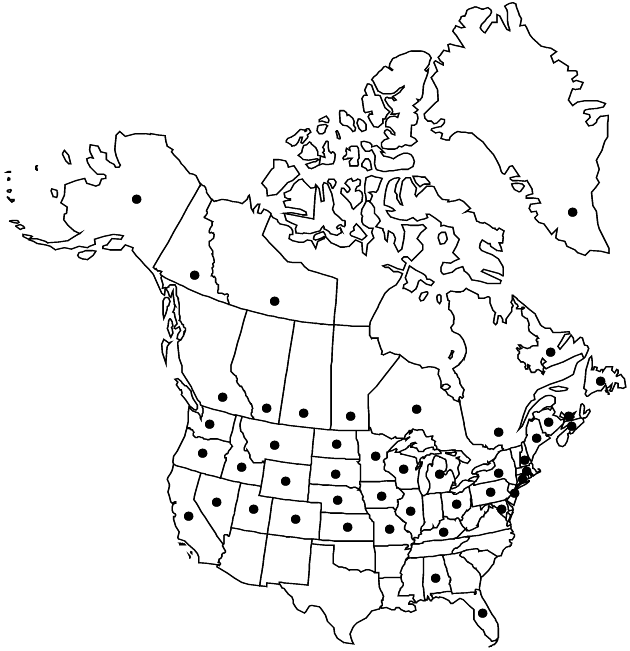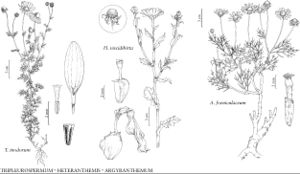Difference between revisions of "Tripleurospermum inodorum"
Tanaceteen, 32. 1844.
RevisionBot (talk | contribs) m (Bot: Adding category Revised Since Print) |
RevisionBot (talk | contribs) m (Bot: Adding category Revised Since Print) |
||
| (11 intermediate revisions by 3 users not shown) | |||
| Line 8: | Line 8: | ||
}} | }} | ||
|common_names=Scentless or false mayweed;false chamomile;matricaire inodore | |common_names=Scentless or false mayweed;false chamomile;matricaire inodore | ||
| − | |basionyms={{Treatment/ID/ | + | |special_status={{Treatment/ID/Special_status |
| + | |code=I | ||
| + | |label=Introduced | ||
| + | }}{{Treatment/ID/Special_status | ||
| + | |code=F | ||
| + | |label=Illustrated | ||
| + | }} | ||
| + | |basionyms={{Treatment/ID/Basionym | ||
|name=Matricaria inodora | |name=Matricaria inodora | ||
|authority=Linnaeus | |authority=Linnaeus | ||
| + | |rank=species | ||
| + | |publication_title=Fl. Suec. ed. | ||
| + | |publication_place=2, 297. 1755 | ||
}} | }} | ||
|synonyms={{Treatment/ID/Synonym | |synonyms={{Treatment/ID/Synonym | ||
|name=Chamomilla inodora | |name=Chamomilla inodora | ||
|authority=(Linnaeus) K. Koch | |authority=(Linnaeus) K. Koch | ||
| − | }}{{Treatment/ID/Synonym | + | |rank=species |
| + | }} {{Treatment/ID/Synonym | ||
|name=M. maritima subsp. inodora | |name=M. maritima subsp. inodora | ||
|authority=(Linnaeus) Soó | |authority=(Linnaeus) Soó | ||
| − | }}{{Treatment/ID/Synonym | + | |rank=subspecies |
| + | }} {{Treatment/ID/Synonym | ||
|name=M. maritima var. inodora | |name=M. maritima var. inodora | ||
|authority=(Linnaeus) Soó | |authority=(Linnaeus) Soó | ||
| − | }}{{Treatment/ID/Synonym | + | |rank=variety |
| + | }} {{Treatment/ID/Synonym | ||
|name=M. perforata | |name=M. perforata | ||
|authority=(Mérat) M. Lainz | |authority=(Mérat) M. Lainz | ||
| − | }}{{Treatment/ID/Synonym | + | |rank=species |
| + | }} {{Treatment/ID/Synonym | ||
|name=Tripleurospermum maritimum subsp. inodorum | |name=Tripleurospermum maritimum subsp. inodorum | ||
|authority=(Linnaeus) Applequist | |authority=(Linnaeus) Applequist | ||
| − | }}{{Treatment/ID/Synonym | + | |rank=subspecies |
| + | }} {{Treatment/ID/Synonym | ||
|name=Tripleurospermum perforatum | |name=Tripleurospermum perforatum | ||
| − | |authority= | + | |authority= |
| + | |rank=species | ||
}} | }} | ||
|hierarchy=Asteraceae;Asteraceae tribe Anthemideae;Tripleurospermum;Tripleurospermum inodorum | |hierarchy=Asteraceae;Asteraceae tribe Anthemideae;Tripleurospermum;Tripleurospermum inodorum | ||
| Line 45: | Line 61: | ||
|elevation=0–1500+ m | |elevation=0–1500+ m | ||
|distribution=Greenland;Alta.;B.C.;Man.;N.B.;Nfld. and Labr.;N.W.T.;N.S.;Ont.;P.E.I.;Que.;Sask.;Yukon;Ala.;Alaska;Calif.;Colo.;Conn.;Idaho;Ill.;Iowa;Kans.;Ky.;Maine;Md.;Mass.;Mich.;Minn.;Mo.;Mont.;Nebr.;Nev.;N.H.;N.J.;N.Y.;N.Dak.;Ohio;Oreg.;Pa.;S.Dak.;Utah;Wash.;Wis.;Wyo.;also introduced in Europe;Pacific Islands (New Zealand). | |distribution=Greenland;Alta.;B.C.;Man.;N.B.;Nfld. and Labr.;N.W.T.;N.S.;Ont.;P.E.I.;Que.;Sask.;Yukon;Ala.;Alaska;Calif.;Colo.;Conn.;Idaho;Ill.;Iowa;Kans.;Ky.;Maine;Md.;Mass.;Mich.;Minn.;Mo.;Mont.;Nebr.;Nev.;N.H.;N.J.;N.Y.;N.Dak.;Ohio;Oreg.;Pa.;S.Dak.;Utah;Wash.;Wis.;Wyo.;also introduced in Europe;Pacific Islands (New Zealand). | ||
| − | |discussion=<p>Tripleurospermum inodorum has been classified as a noxious weed (class C) in the state of Washington and is considered invasive in other states (it is resistant to some herbicides); it is a weed of cereals in western Canada. W. L. Applequist (2002) has shown that the name Matricaria inodora is not a superfluous new name for M. chamomilla as earlier stated by S. Rauschert (1974). Therefore, the appropriate name under Tripleuro-spermum is T. inodorum. She also considered its type to belong in T. maritimum and formally recognized it there as subsp. inodorum, on the basis of hybridization with other T. maritimum subspecies (A. Vaarama 1953); on the same basis, however, Hämet-Ahti maintained the species distinction between T. inodorum and T. maritimum, while making T. phaeocephalum a subspecies of the latter. Q. O. N. Kay (1994), in a more extensive review of the literature and of hybridization data, also maintained T. inodorum and T. maritimum as distinct species, a conclusion followed here. From the standpoint of weed science, taxonomic merging of T. inodorum and T. maritimum has the inconvenience of grouping under a single specific name taxa that have different physiologies, ecologies, weed potentials, and, possibly, reactions to weed control measures.</p><!-- | + | |introduced=true |
| − | --><p>The name Matricaria inodora var. agrestis Weiss was not validly published.</p> | + | |discussion=<p><i>Tripleurospermum inodorum</i> has been classified as a noxious weed (class C) in the state of Washington and is considered invasive in other states (it is resistant to some herbicides); it is a weed of cereals in western Canada. W. L. Applequist (2002) has shown that the name <i>Matricaria</i> inodora is not a superfluous new name for <i>M. chamomilla</i> as earlier stated by S. Rauschert (1974). Therefore, the appropriate name under Tripleuro-spermum is <i>T. inodorum</i>. She also considered its type to belong in <i>T. maritimum</i> and formally recognized it there as subsp. inodorum, on the basis of hybridization with other <i>T. maritimum</i> subspecies (A. Vaarama 1953); on the same basis, however, Hämet-Ahti maintained the species distinction between <i>T. inodorum</i> and <i>T. maritimum</i>, while making T. phaeocephalum a subspecies of the latter. Q. O. N. Kay (1994), in a more extensive review of the literature and of hybridization data, also maintained <i>T. inodorum</i> and <i>T. maritimum</i> as distinct species, a conclusion followed here. From the standpoint of weed science, taxonomic merging of <i>T. inodorum</i> and <i>T. maritimum</i> has the inconvenience of grouping under a single specific name taxa that have different physiologies, ecologies, weed potentials, and, possibly, reactions to weed control measures.</p><!-- |
| + | --><p>The name <i>Matricaria</i> inodora var. agrestis Weiss was not validly published.</p> | ||
|tables= | |tables= | ||
|references={{Treatment/Reference | |references={{Treatment/Reference | ||
| Line 58: | Line 75: | ||
-->{{#Taxon: | -->{{#Taxon: | ||
name=Tripleurospermum inodorum | name=Tripleurospermum inodorum | ||
| − | |||
|authority=(Linnaeus) Schultz-Bipontinus | |authority=(Linnaeus) Schultz-Bipontinus | ||
|rank=species | |rank=species | ||
| Line 73: | Line 89: | ||
|publication title=Tanaceteen, | |publication title=Tanaceteen, | ||
|publication year=1844 | |publication year=1844 | ||
| − | |special status= | + | |special status=Introduced;Illustrated |
| − | |source xml=https:// | + | |source xml=https://bitbucket.org/aafc-mbb/fna-data-curation/src/2e0870ddd59836b60bcf96646a41e87ea5a5943a/coarse_grained_fna_xml/V19-20-21/V19_956.xml |
|tribe=Asteraceae tribe Anthemideae | |tribe=Asteraceae tribe Anthemideae | ||
|genus=Tripleurospermum | |genus=Tripleurospermum | ||
Latest revision as of 19:33, 6 November 2020
Annuals (sometimes biennials or perennials), (5–)30–60(–80) cm. Stems 1, ascending to erect, usually branched distally, sometimes proximally, glabrous or glabrate (sparsely hairy when young). Leaf blades 2–8 cm, ultimate lobes filiform, 4–20 mm, not fleshy, apices apiculate. Heads (1–)10–200+, 3–4.5 cm diam., in corymbiform arrays of solitary heads at ends of branches. Phyllaries centrally dark greenish or brownish, oblong, subequal, scarious margins colorless to light brown, 0.1–0.2 mm wide. Ray florets 10–25; corollas (4–)10–13(–20) mm. Disc corollas 1–2.5 mm. Cypselae pale brown, ribs separated by 1/3+ their widths, abaxial-apical resin glands ± circular, faces minutely roughened between ribs. 2n = 18, 36.
Phenology: Flowering May–Sep.
Habitat: Fields, dry shorelines, waste places
Elevation: 0–1500+ m
Distribution

Introduced; Greenland, Alta., B.C., Man., N.B., Nfld. and Labr., N.W.T., N.S., Ont., P.E.I., Que., Sask., Yukon, Ala., Alaska, Calif., Colo., Conn., Idaho, Ill., Iowa, Kans., Ky., Maine, Md., Mass., Mich., Minn., Mo., Mont., Nebr., Nev., N.H., N.J., N.Y., N.Dak., Ohio, Oreg., Pa., S.Dak., Utah, Wash., Wis., Wyo., also introduced in Europe, Pacific Islands (New Zealand).
Discussion
Tripleurospermum inodorum has been classified as a noxious weed (class C) in the state of Washington and is considered invasive in other states (it is resistant to some herbicides); it is a weed of cereals in western Canada. W. L. Applequist (2002) has shown that the name Matricaria inodora is not a superfluous new name for M. chamomilla as earlier stated by S. Rauschert (1974). Therefore, the appropriate name under Tripleuro-spermum is T. inodorum. She also considered its type to belong in T. maritimum and formally recognized it there as subsp. inodorum, on the basis of hybridization with other T. maritimum subspecies (A. Vaarama 1953); on the same basis, however, Hämet-Ahti maintained the species distinction between T. inodorum and T. maritimum, while making T. phaeocephalum a subspecies of the latter. Q. O. N. Kay (1994), in a more extensive review of the literature and of hybridization data, also maintained T. inodorum and T. maritimum as distinct species, a conclusion followed here. From the standpoint of weed science, taxonomic merging of T. inodorum and T. maritimum has the inconvenience of grouping under a single specific name taxa that have different physiologies, ecologies, weed potentials, and, possibly, reactions to weed control measures.
The name Matricaria inodora var. agrestis Weiss was not validly published.
